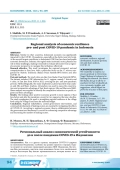Relevance. Similar to other countries, Indonesia’s economy was significantly impacted by the COVID-19 pandemic, especially at the district and city levels. As the second-largest contributor to Indonesia’s GDP, East Java faced noticeable economic downturns. Industry, the region’s main economic sector, played a key role in these challenges, making it essential to evaluate all sectors from a regional economic perspective to navigate this turbulence effectively. Research objective. This study investigates the regional economy’s sectoral competitiveness in East Java, with a particular focus on the 17 sectors categorized by Statistic Indonesia (Badan Pusat Statistik-BPS) before and after COVID-19. Data and methods. The study relies on data from Badan Pusat Statistik (BPS)). The dataset includes GDP information for 11 regions, namely 7 districts and 4 cities, in East Java from 2018 to 2022, covering the pre- and post-pandemic periods. Methodologically, the study employed Location Quotient (LQ) analysis and Mix and Share Analysis. LQ analysis was used to assess the concentration and comparative advantage of East Java’s regions. Mix and Share and Shift-Share analyses were applied to identify the competitive industries in specific regions and their advantages. Results. The findings show positive economic growth in most regions of East Java before and after the pandemic, except for two regencies that saw a decline. The study emphasizes the need to strengthen regional resilience at the village level using the Village Fund from the national budget. Conclusions. Regional stakeholders, central government interventions, and continued development of leading sectors are essential for mitigating the effects of COVID-19. According to regional economic theory, collaboration between the government and businesses is crucial for enhancing competitive advantage and increasing the number of leading sectors.
